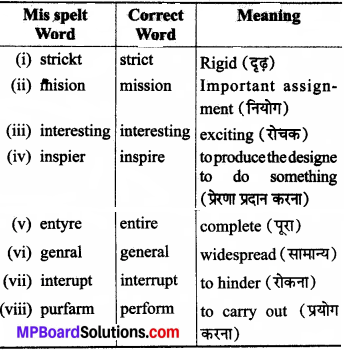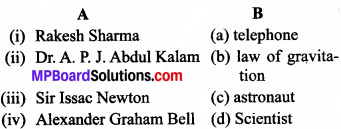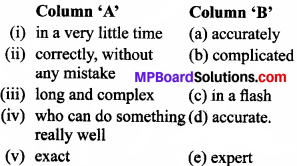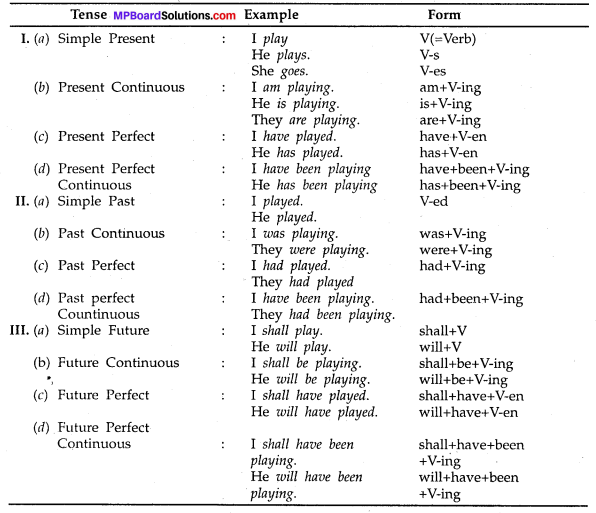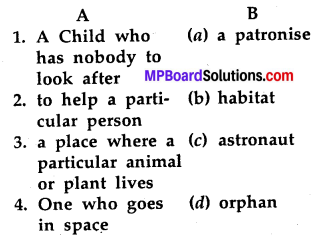Guys who are planning to learn the fundamentals of English can avail the handy study material using MP Board Solutions for Class 8 General English Solutions Chapter 10 The Balloon Man Questions and Answers. You Can Download MP Board Class 8 English Solutions Questions and Answers, Notes, Summary, Guide, Pdf. Refer to the Madhya Pradesh State Board Solutions for English PDF available and score better grades. Simply click on the quick links available for MP Board Solutions for Class 8 General English Solutions Chapter 10 The Balloon Man Questions and Answers and prepare all the concepts in it effectively. Take your preparation to the next level by availing the Madhya Pradesh State Board Solutions for Class 8 English prepared by subject experts.
MP Board Class 8th General English Solutions Chapter 10 The Balloon Man
Do you feel the concept of English is difficult to understand? Not anymore with our MP Board Solutions for Class 8 General English Solutions Chapter 10 The Balloon Man Questions and Answers. All the Solutions are given to you with detailed explanation and you can enhance your subject knowledge. Use the Madhya Pradesh State Board Solutions for Class 8 English PDF for free of cost and prepare whenever you want.
The Balloon Man Textual Exercise
Listen and Repeat
(सुनो और दुहरा ओ):
Answer:
Do Yourself.
Word Power
(शब्द सामर्थ्य:)
(A) Pick out the rhyming words from the poem for the following words:
(कविता में से निम्न शब्दों के तुकान्त शब्दों को छांटो:)
- folds
- funny
- dining
- mug
- failing.
Answer:
- holds
- sunny
- shining
- tug,
- sailing.
(B) Write the encircled words against their correct meanings:
(गोले में दिए शब्दों को उनके दिये सही अर्थ के सामने लिखें:)
- Where the things are sold.
- A bag of thin rubber that becomes larger and rounder when filled with air.
- A vehicle with two or four wheels pulled by a horse.
- A thread used to tie the balloon.
- The space above the earth that you see when you look up.
Answer:
- market
- balloon
- cart
- string
- sky.
Comprehension
(बोष प्रश्न)।
Answer the following questions:
(निम्नलिखित प्रश्नों के उत्तर दें:)
Question 1.
Who always comes on market days ?
(हू ऑल्वेज़ कम्स ऑन मार्किट डेज़ ?).
बाजार वाले दिनों में कौन हमेशा आता है ?
Answer:
The balloon man always comes on market days.
(द बैलून मैन ऑल्वेज़ कम्स ऑन मार्किट डेज.)
गुब्बारे वाला हमेशा बाजार वाले दिनों में आता है।
Question 2.
What does he hold ?
(व्हॉट डज़ ही होल्ड ?)
वह क्या पकड़े हुए रहता है।
Answer:
He holds a lovely bunch of balloons.
(ही होल्ड्स अ लवली बन्च ऑफ बैलून्स.)
वह गुब्बारों का एक सुन्दर गुच्छा पकड़े रहता है।)
Question 3.
What are the colors of the balloons which shine far away?
(व्हॉट आर द कलर्स ऑफ द बैलून्स विच शाइन फॉर अवे?)
जो गुब्बारे दूर चमक रहे हैं, उनके क्या रंग हैं ?
Answer:
The balloons which shine far away are red, purple, blue and green.
(द बैलून्स विच शाइन फार अवे आर रैड, परपल, ब्लू एण्ड ग्रीन।)
जो गुब्बारे दूर चमक रहे हैं वे लाल, जामुनी, नीले व हरे हैं।
Question 4.
What do the balloons do when it is a windy day?
(व्हॉट डू द बैलून्स डू व्हेन इट इज ए विण्डी डे ?)
हवा वाले दिन गुब्बारे क्या करते हैं ?
Answer:
On a windy day the balloons tug and tug like anything.
(ऑन अ विण्डी डे बैलून्स टग एण्ड टग लाइक ऐनीथिंग.)
हवा वाले दिन गुब्बारे किसी भी वस्तु की तरह यहाँ-वहाँ खिंचते हैं।
Question 5.
Write any four lines of this poem.
(राइट ऐनी फोर लाइन्स ऑफ दिस पोयम.)
इस कविता की कोई भी चार पंक्तियाँ लिखो।
Answer:
Four lines are:
Some day perhaps he’ll let them go
And we shall see them sailing high
And stand and watch them from below,
They would look pretty in the sky!
(फोर लाइन्स आर –
सम डे परहैप्स ही विल लेट दैम गो
ऐण्ड वी शैल सी दैम सेलिंग हाइ,
ऐण्ड स्टैण्ड ऐण्ड वॉच दैम फ्रॉम बिलो,
दे वुड लुक प्रिटी इन द स्काइ!)
चार पंक्तियाँ हैंकिसी दिन शायद वह उन्हें जाने देगा।
और हम उन्हें ऊपर उड़ता हुआ देखेंगे और हम नीचे से खड़े होकर देखेंगे।
वो आसमान में सुन्दर दिखेंगे।
Question 6.
What does the poet say in the third stanza ?
(व्हॉट डेज़ द पोयट से इन द थर्ड स्टैंजा ?)
कवि तीसरे छन्द में क्या कहता है ?
Answer:
The poet says that all small and big balloons are tied with a string and if there is wind then they will tug like anything.
(द पोयट सेज़ दैट ऑल स्मॉल एण्ड बिग बेलून्स आर टाइड विद अ स्ट्रिंग एण्ड इफ देअर इज़ विन्ड देन दे विल टग लाइक एनीथिंग।)
कवि कहता है कि कुछ गुब्बारे छोटे हैं और कुछ बड़े हैं। सब धागे से बँधे हैं और यदि हवा चलेगी तो ये किसी भी दिशा में खिंचते चले जायेंगे।
Let’s Read
(आओ पढ़ो:)
Read the given passage carefully and answer the following questions:
(दिये गये उद्धरण को पढ़ें और नीचे दिए प्रश्नों के उत्तर दें:)
Question 1.
Where did the rich man live ?
(व्हेअर डिड द रिच मैन लिव ?)
अमीर आदमी कहाँ रहता था ?
Answer:
The rich man lived in a small village.
(द रिच मैन लिव्ड इन अस्मॉल विलेज.)
अमीर आदमी एक छोटे गाँव में रहता था।
Question 2.
Why did the deaf friend go to visit the rich man?
(व्हॉय डिड द डेफ फ्रण्ड गो टु विजिट द रिच मैन ?)
बहरा दोस्त अमीर आदमी से मिलने क्यों गया था ?
Answer:
The deaf friend went to visit the rich man because the rich man was ill.
(द डेफ़ फ्रन्ड वैन्ट टू विजिट द रिच मैन बिकॉज द रिच मैन वॉज़ इल.)
बहरा दोस्त अमीर आदमी से मिलने गया क्योंकि अमीर आदमी बीमार था।
Question 3.
Fill in the blanks with the correct words given in brackets.
Answer:
(a) The rich man was ill.
(b) The deaf man wanted to make the rich man happy.
Question 4.
Say whether the following statements are True or false.
- The deaf man’s questions made the rich man happy.
- The deaf man said all the ‘wrong’ things because he could not hear the rich man’s answer
- The deaf man went home, thinking that he had made his friend happy.
Answer:
- False
- True
- True.
Let’s write
(आओ लिखें):
Read carefully the second stanza of the poem again. The poet has described the colours of the balloons. Have you ever been to a fair and seen a balloon seller ? Write a paragraph about the shapes and colours of the balloons and also other things he sells.
(कविता का दूसरा पद्य – खण्ड दुबारा पढ़ें। कवि ने गुब्बारों के रंगों का वर्णन किया है। क्या तुम मेले में गए हो और गुब्बारे वाले को देखा है ? गुब्बारों के रंगों और आकारों और अन्य वस्तुएँ जो वह बेचता है के बारे में एक पैराग्राफ लिखें।)
Answer:
See ‘Paragraph Writing’ in Grammar Section.
Let’s do it
(आओ इसे करें):
(1) Form groups and read the poem loudly.
Answer:
Do Yourself.
(2) Make a scrap book of pictures of things and different shapes of balloons sold in the fair you have visited. Write the names of things and colours of the balloons in your notebook.
Answer:
Students should do it themselves.
The Balloon Man Word Meanings
Bunch (बन्च) – गुच्छा; Sigh (साई) – गहरी सांस; Shining (शाइनिंग) – चमकीला; Watch (वॉच) – देखना; Tug (टग) – निश्चित दिशा में खींचना / खिंचना; Tied together (टाइड टुगेदर) – आपस में बँधे; String (स्ट्रिंग) – धागा; Pretty (प्रिटी) – सुन्दर; Perhaps (परहैप्स) – संयोग से:
The Balloon Man Summary, Pronunciation & Translation
1. He always comes on market days,
And holds balloons-a lovely bunch,
And in the market square he stays,
And never seems to think of lunch.
ही ऑल्वेज कम्स ऑन मार्केट डेज़,
एण्ड होल्ड्स बैलून्स-अ लवली बंच,
एण्ड इन द मार्केट स्क्वायर ही स्टेज,
एण्ड नैवर सीम्स टु थिंक ऑफ लंच.
अनुवाद:
वह हमेशा बाजार लगने वाले दिनों में आता है। और गुब्बारों का सुन्दर गुच्छा पकड़े रहता है। बाजार के चौराहे पर वह खड़ा रहता है और दोपहर के भोजन के लिये भी सोचता प्रतीत नहीं होता है।
2. They are red and purple,
blue and green,
And when it is a sunny day,
Tho’ carts and people get between,
You see them shining far away.
दे आर रैड एण्ड पर्पल, ब्लू एण्ड ग्रीन,
एण्ड व्हेन इट इज अ सनी डे,
दो’ कार्ट्स एण्ड पीपुल गेट बिटवीन,
यू सी दैम शाइनिंग फार अवे,
अनुवाद:
वे (गुब्बारे) लाल, और बैंगनी, नीले और हरे हैं। और ऐसे दिन जब धूप खिली हो और जबकि गाड़ियाँ और लोग बीच में हों तब भी तुम उन्हें दूर चमकता हुआ देख सकते हो।
3. And some are big and some are small
All tied together with a string,
And if there is a wind at all,
They tug and tug like anything.
एण्ड सम आर बिग एण्ड सम आर स्मॉल,
ऑल टाईड टुगेदर विद अ स्ट्रिंग,
एण्ड इफ देअर इज अ विंड-ऐट ऑल,
दे टग एण्ड टग लाइक ऐनीथिंग.
अनुवाद:
कुछ गुब्बारे बड़े और कुछ छोटे हैं। सब एक धागे से बँधे हैं। यदि हवा चलती है तो वे किसी भी दिशा में खिंच जाते हैं।
4. Some day perhaps he’ll let them go,
And we shall see them sąiling high,
And stand and watch them from below,
They would look pretty in the sky !
सम डे परहैप्स ही विल लैट दैम गो,
एण्ड वी शैल सी दैम सेलिंग हाइ,
एण्ड स्टैण्ड एण्ड वॉच दैम फ्रॉम बिलो,
दे वुड लुक प्रिटी इन द स्काइ.
अनुवाद:
किसी दिन शायद वह उन्हें उड़ जाने देगा, और हम उन्हें ऊपर तैरते हुए देखेंगे, और हम खड़े होकर नीचे से उन्हें देखेंगे, वे आकाश में सुन्दर दिखाई देंगे।
We wish the knowledge shared regarding MP Board Solutions for Class 8 General English Solutions Chapter 10 The Balloon Man Questions and Answers has been helpful to you. If you need any further help feel free to ask us and we will get back to you with the possible solution. Bookmark our site to avail the latest updates on different state boards solutions in split seconds.
